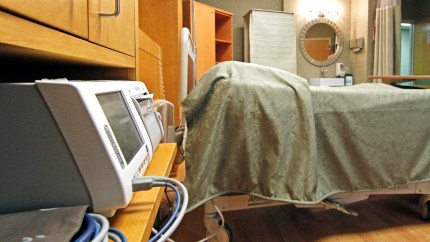Study finds new blood test could be key to earlier Alzheimer’s detection
A recent study finds a blood test to detect Alzheimer’s before symptoms show may be getting closer.

This week, the scientific journal JAMA Neurology released a study that found a potential key to identifying an Alzheimer’s detector. According to the study, testing a person’s blood for a specific type of protein can provide surprisingly accurate information when screening for Alzheimer’s.
“What was impressive with these results is that the blood test was just as accurate as advanced testing like cerebrospinal fluid tests and brain scans at showing Alzheimer’s disease pathology in the brain,” Nicholas Ashton, one of the study’s lead authors and a professor of neurochemistry at the University of Gothenburg in Sweden, told CNN in an email.
The National Institutes of Health describes Alzheimer’s, which affects an estimated 6 million Americans, as “a brain disorder that slowly destroys memory and thinking skills, and eventually, the ability to carry out the simplest tasks.”
Even though the disease is categorized among the seven leading causes of death in the country, traditional Alzheimer’s testing, such as neurology exams, brain imaging, and cerebrospinal fluid tests, is limited and often inaccessible, CNN reported.
“PET scans have radiation and can cost over $5,000. Spinal taps are great because you get detailed information, but not everyone wants one, and it is expensive and not covered by insurance. These blood tests are generally more reasonably priced. Having a blood test like this can also help democratize access for people and just make it easier for our health care system to more proactively manage the tsunami of dementia risk that our society is facing,” Dr. Richard Isaacson, director of research at the Institute for Neurodegenerative Diseases in Florida, said per CNN. “This is the key to unlock the door into the field of Alzheimer’s prevention and preventive neurology.”
Recommended Stories
How does the test work?
The study introduces the use of ALZpath pTau217 assay, a testing tool developed by the company ALZpath. This blood test specifically looks for damaging proteins like p-tau217, beta-amyloid and tau, which are often associated with Alzheimer’s disease. Proven to be just as accurate as brain scans and spinal taps, the tests were 96% accurate in finding elevated beta-amyloid levels and 97% accurate in finding tau levels, researchers found.
“A robust and accurate blood-based biomarker would enable a more comprehensive assessment of cognitive impairment in settings where advanced testing is limited,” co-authors of the study, professors Kaj Blennow and Henrik Zetterberg from the University of Gothenburg, wrote. “Therefore, use of a blood biomarker is intended to enhance an early and precise (Alzheimer’s disease} diagnosis, leading to improved patient management and, ultimately, timely access to disease-modifying therapies.”
How is it more accessible?
Unlike other tests that can cost more than $5,000, ALZpath states that these special blood tests will cost between $200 and $500 when made available to the public, CNN reported. Additionally, blood tests are among the more common testing methods that can typically be done in the office during a patient’s visit.
“People get cholesterol tests before they have a heart attack. People get cholesterol tests before they have a stroke. To me, this type of test will eventually be best served in people before they start to have cognitive symptoms,” Isaacson told CNN. “Just like cholesterol tests, by following the pTau217 level over time, we can better understand how various therapies and lifestyle changes are working to keep Alzheimer’s under better control.”
It could allow time for planning
By 2050, the Alzheimer’s Association predicts that the disease will impact approximately 13 million people. With that statistic looming, physicians also predict adults will have to begin routine Alzheimer’s testing sooner.
According to Issacson, screening for the disease before patients begin showing signs “leaves a lot of time” for them to discuss a plan with their doctor and make more brain-healthy choices. Similarly, David Curtis, an honorary professor at the University College London, explained that until effective Alzheimer’s treatments become available, these screenings can help doctors identify and get a head start on treating high-risk patients.
“This study shows that a simple blood test might be able to do this by measuring levels of tau protein in the blood, which has been phosphorylated in a specific way. This could potentially have huge implications,” Curtis said in a statement distributed by the UK-based Science Media Centre. “However, I think the real hope is that better treatments can also be developed. The combination of a simple screening test with an effective treatment for Alzheimer’s disease would have a dramatic impact for individuals and for society.”
Never miss a beat: Get our daily stories straight to your inbox with theGrio’s newsletter.








